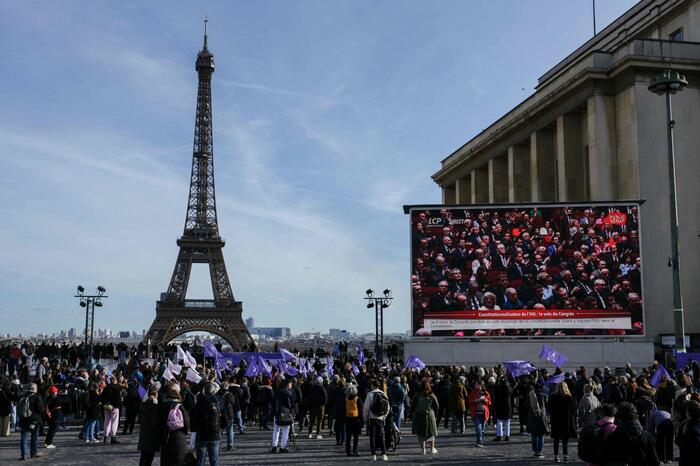When on June 24, 2022, the United States Supreme Court annulled the right to abortion, Tarah Demant (Berkeley, California, United States, 43 years old) felt as if she had been punched in the stomach, as if the air had been taken from her.
“When Judge Samuel Alito’s draft opinion that overturned
Roe v. Wade
(1973) was leaked in May, those of us who work on human rights and reproductive rights, and particularly on abortion rights, were not caught by surprise, because we already We knew that this moment was coming, but it was still a
shock
total".
But when the Supreme Court made the decision in June, "it was as if the ground fell out from under us, that we began to have less rights than our mothers, and even than our grandmothers."
There they realized, laments Demant, that "everything that advances can go backwards," said the expert on gender and human rights from Amnesty International United States, visiting Madrid on Thursday.
Ask.
What exactly changed on June 24, 2022?
Answer.
That day, six conservative judges ruled that abortion was not protected by the Constitution [of the United States] and returned to the 50 states the power to legislate on the subject.
So far, there are 13 States that have prohibited, to a greater or lesser extent, the legal and safe termination of pregnancy.
The entire South, actually, from Texas to Florida, passing through Oklahoma, Arkansas, South Carolina, Tennessee and Kentucky, among others.
They are thousands of miles of prohibition, a space like the one between Madrid and Saint Petersburg.
So you can't just go to the next state to have an abortion, because the next state has also banned abortion, and the next state has also banned abortion.
Q.
Prohibiting abortion by law does not prevent its practice, right?
A.
Of course not!
What the abortion ban achieves is an increase in the maternal mortality rate.
And the United States has the highest maternal mortality rate in the so-called developed world.
For two reasons.
First, because if women cannot find a safe way to abort, they will try unsafe ways.
The second, because what is caused are forced pregnancies in a country with little access to medical care.
In addition, the ban on abortion increases poverty and worsens education, not only for women, but also for children, because women who are able to control their reproductive lives and choose the number of children they want make their children have a better life and a better education.
In the 1970s, as the Republicans were losing control at the state and national level, they looked for an issue to politicize, and they chose abortion.
Q.
Who are the most affected by the annulment of the right to abortion?
R.
The rich whites, I already tell you no.
The most affected are lower-class women, because many cannot afford medical attention —in the United States, an abortion costs between 500 and 1,500 dollars, depending on the State and the method— or a plane ticket to another State, or absent from work.
Also those who belong to racial minorities, migrants, and in particular the undocumented, for whom traveling is something terrifying, and indigenous people.
And those who live in rural areas, where there is no access to medical care.
Q.
There are States that have promulgated norms that guarantee the voluntary interruption of pregnancy beyond the sentences of the Supreme Court.
Which is it?
R.
More liberal states, such as California, Colorado, Connecticut, New York, New Jersey, Vermont... that have tried to pass more protective laws.
But if the federal government passes a law that prohibits or limits abortion, it will automatically remove all protections.
Politicians and parties cannot decide what human rights are, because we are born with them, because at the time they were discussed, agreed upon and signed.
Q.
How did you get to that point?
R.
Well, there is a specific story.
When Roe [v. Wade] was decided in 1973, nearly 50 years ago, abortion was not a particularly politicized issue.
Now yes.
What happened was that in the 1970s, as the Republicans were losing control at the state and national level, they looked for an issue to politicize, and they chose abortion.
Before, neither they nor the Church had positioned themselves on the issue.
But since then, they have built a voter base who have become obsessed with banning abortion as their ultimate goal.
Q.
Are they the majority?
A.
No!
Not at all!
The vast majority of Americans still support access to safe, legal termination of pregnancy.
In fact, 70% of people surveyed before and after Roe agree that people should have access to abortion.
So this is not about popular opinion.
It is, as I said, the politicization of abortion.
I respect the opinions of the other 30%, they have every right to have them.
What they have no right to is to impose them on others.
Protesters for and against abortion on December 1 before the US Supreme Court in Washington. CHIP SOMODEVILLA (AFP)
Q.
In addition to gaining power, is it also about controlling women's bodies?
A.
Of course.
And not only to control their bodies, but also their opportunities, their lives, their destinies.
It is about forcing people to give birth.
It's scary, really scary.
We are in a very dark time, and things are likely to get worse before they get better.
However, the abortion rights movement is strong, and we have the majority on our side.
We will keep fighting!
Q.
How can you counteract, from activism, this response of reactionary movements to the advances in abortion?
R.
The first thing is to understand that the right to abortion is a human right, not a political debate.
The second thing is to focus on what women want, to trust that they know what is best for them.
Third, bring the issue of abortion to the kitchen table, destigmatize it.
Fourth, be active and participate, don't wait until it's too late.
It took 40 years to get Roe, it took 40 years to undo it, and it could take another 40 to win it back.
You start by politicizing the right to abortion and you end up losing it.
Ours is a long fight, and we are going to fight it.
What we don't want is for women from other countries to have to fight the same thing.
From the United States to the rest of the world
Q.
All this about the politicization of abortion, does it have to do with what is happening in Spain?
A.
Very much.
I have seen on the news that the leader of the PP, [Alberto Núñez] Feijóo, has said that the voluntary termination of pregnancy is not a fundamental right, but rather a right that is within the law.
In other words, he has made abortion a political issue, an opinion, when it is really a matter of human rights and health.
That's how it starts... That's why you have to be very attentive to this type of speech.
In addition, politicians and parties cannot decide what human rights are, since we are born with them, because at the time they were discussed, agreed upon and signed.
70% of people surveyed before and after Roe agree that people should have access to abortion
P.
The Government of the Junta de Castilla y León, made up of PP and Vox [of the right and extreme right, respectively], has recently left the application of anti-abortion measures in the hands of doctors, such as offering women to listen to the fetal heartbeat in the first weeks or have a 4D ultrasound.
What do you think of this decision?
R.
It's about trusting women to know what's best for them, what's best for their bodies, what's best for their lives, what's best for their families.
And every impediment we put in their way is a barrier to safe medical care.
Do you have to drive further because the public hospital has conscientious objectors?
Do you have to see an ultrasound or listen to fetal heart activity?
Do you have to go through mandatory therapy?
What the government is saying is that women do not know what is best for them.
And that's not a human rights framework and it's not a health care framework.
It is an authoritarian and paternalistic framework of government control over women's bodies.
He is not trying to take care of them, but to control them.
It starts with these little barriers,
It begins with these small barriers, designed to discourage women from having an abortion, and ends with a total ban on abortion.
Q.
How does the decline in abortion in the United States affect the rest of the world?
Will it reach Europe and Latin America?
R.
The reality is that if human rights go backwards in the United States, they go backwards beyond its own borders.
Now, we are seeing progress in human rights in the rest of the world, specifically in abortion.
We are seeing advances in the right to abortion around the world, such as Argentina, Mexico, Colombia, Ireland, Northern Ireland, etc.
That is, the United States is out of sync.
But it is true that what the United States does matters.
And when the United States politicizes abortion, governments and authoritarian parties seeking power and control may follow suit, and end up controlling the definition of human rights.
You can follow PLANETA FUTURO on
,
and
, and subscribe
here
to our 'newsletter'
.













/cloudfront-eu-central-1.images.arcpublishing.com/prisa/KMEYMJKESBAZBE4MRBAM4TGHIQ.jpg)

